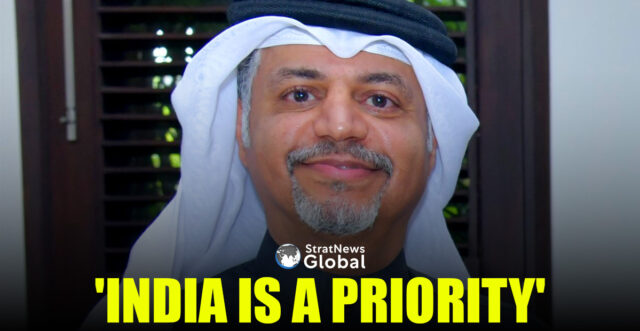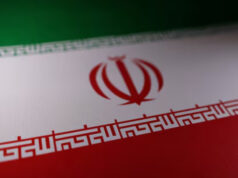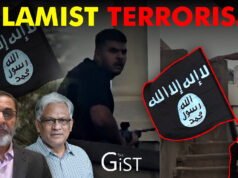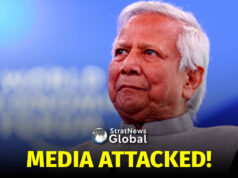The Arab League has reiterated its commitment to combating terrorism and expanding its strategic and economic partnership with India. In an exclusive interview with StratNews Global, Ambassador Yusuf Mohamed Jameel, Head of the League of Arab States Mission in New Delhi, laid out a bold vision for transforming centuries-old cultural ties into a future-facing economic and strategic partnership.
Arab League On India-Pak Peace
Commenting on South Asia’s volatility, particularly the India-Pakistan dynamics, Ambassador Jameel was clear: “We are unequivocally against terrorism and stand firmly for peace and diplomacy.”
Referring to the April 2025 terror attack in Pahalgam, he said, “The Arab League immediately condemned the attack and extended condolences to India. Our message is clear: we support peaceful conflict resolution in accordance with international law and the UN Charter.”
Welcoming the ongoing ceasefire between India and Pakistan, he added, “India’s 7% GDP growth cannot be sustained without a peaceful neighbourhood. We view regional stability as essential not just for India but also for broader economic integration.”
Doubling Down On Trade And Investment
With trade volumes already hovering around $200 billion, the Arab League sees this as a baseline, not a ceiling, for India-Arab economic engagement. Ambassador Yusuf Mohamed Jameel made it clear that expanding trade and investment is central to the League’s vision for future cooperation with India.
“We believe the $200 billion trade figure is only the foundation,” said Ambassador Jameel. “The next phase must focus on diversification—moving beyond energy into technology, food security, logistics and green infrastructure. Our economies are complementary, and the time to scale up is now.”
The Ambassador emphasised that while oil and fertilisers remain the backbone of existing trade—Arab nations supply 60% of India’s crude oil and over 50% of its fertiliser imports—the future lies in high-growth, high-tech sectors.
“Energy security brought us together,” he said, “but digital transformation, sustainable development and food resilience will take us forward.”
Green Energy & Technology Collaboration
Ambassador Jameel highlighted the urgent need for a joint focus on renewables. “India is emerging as a global hub for green hydrogen. Arab nations are investing heavily in the same. We must work together—on joint ventures, technology transfer and research partnerships in hydrogen, solar and ammonia.”
Investment Flows From The Arab World
With Arab sovereign wealth funds actively seeking emerging-market opportunities, the Ambassador made a pitch for deeper financial integration:
“Arab investment capital is looking for stability, scale and long-term value. India offers all three. Whether it’s infrastructure, digital services or manufacturing, India should be the first-choice destination for Gulf investments.”
Free Trade And Logistics Corridors
Ambassador Jameel called for removing regulatory friction and accelerating connectivity. “We must work towards trade facilitation agreements between India and Arab economies. Ports, rail corridors and digital customs platforms can cut costs and boost volumes dramatically.”
Food Security And Agro-Investments
Highlighting India’s role as the largest food exporter to the Arab League, he said: “We are proud of landmark initiatives like the $7 billion UAE-India Food Security Corridor. It’s a blueprint for future cooperation where India’s agro-power meets the region’s food needs.”
Fin Tech, Digital Payments: “The integration of India’s UPI system with networks in the UAE and Saudi Arabia has revolutionised remittances and daily transactions for over three million Indians in the UAE.”
Education: He also pointed to the first India-Arab Universities’ Presidents’ Conference (2025) as a foundation for deeper academic cooperation.
Trade Vision Anchored In Strategy, Not Sentiment
Ambassador Jameel acknowledged that historical and cultural ties underpin India-Arab relations but stressed that the focus now must shift to strategic economic planning.
“We respect the deep civilisational links but what we need today is a data-driven, sector-specific roadmap. Let’s identify key performance areas—energy transition, supply chain resilience, fintech—and put the numbers behind our shared ambitions.”
He also suggested institutionalising an India-Arab Economic Dialogue, similar to India’s partnerships with ASEAN or the EU.
“We have the India-Arab Cooperation Forum but we must complement it with an economic mechanism that meets annually, tracks outcomes and drives results.”
Strategic Partnerships In Defence, Energy
While no formal military alliance exists between India and the Arab League as a unified bloc, bilateral defence cooperation between India and key Arab nations is gaining strategic depth. Ambassador Yusuf Mohammad Jameel emphasised that defence ties have expanded significantly in recent years, driven by mutual trust and shared security concerns.
“India’s first joint military exercise with Saudi Arabia in 2024 was a milestone,” Jameel said. “It reflected growing interoperability and confidence between our armed forces. Similar defence engagements with the UAE, Qatar, Oman and Egypt only reaffirm the strength and maturity of these relationships.”
These partnerships are not limited to exercises. They span defence training, maritime security coordination, intelligence sharing and technology cooperation. With the Arabian Sea and Indian Ocean increasingly seen as contested spaces, Jameel underscored the importance of maritime collaboration:
“Security of sea lanes is vital to both our regions. India’s naval capabilities, combined with our geographic positioning, create a natural partnership for maritime domain awareness and anti-piracy operations.”
Energy Ties: From Hydrocarbons To Hydrogen
On the energy front, Ambassador Jameel was unequivocal: “Energy remains the cornerstone of our economic relationship.” Arab nations currently supply over 60% of India’s crude oil and a substantial share of its natural gas imports, making the region indispensable to India’s energy security.
However, he also highlighted a deliberate shift toward next-generation energy cooperation. “We are entering a phase of energy transition. India and Arab countries are aligning on renewable energy goals—especially in green hydrogen, ammonia and solar technologies,” he noted.
Platforms like the Arab-India Energy Forum are helping institutionalise these efforts. The forum fosters dialogue on energy innovation, joint research and cross-border investments in sustainable energy.
“We’re not just suppliers and consumers anymore,” Jameel added. “We’re becoming co-creators of a green energy ecosystem that serves both our climate goals and our long-term economic interests.”
Palestinian Cause And India’s Role
Jameel also called for greater Indian engagement in the West Asia peace process. “India’s support for a two-state solution aligns with our position. We also appreciate its humanitarian aid for Gaza but call for a more active Indian role in halting Israeli aggression and easing humanitarian suffering.”
Looking Forward
“India is not just a partner, it’s a priority. We are entering a new era of strategic cooperation, grounded in peace, powered by trade and driven by shared values.” That’s how Ambassador Jameel summed up the Arab League’s India approach.
As India recalibrates its West Asia outreach, the Arab League is clearly ready to meet New Delhi half way with a united stand against extremism and an open hand for economic expansion.





